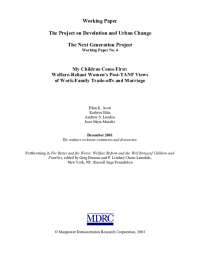My Children Come First
Welfare-Reliant Women's Post-TANF Views of Work-Family Trade-offs and Marriage
Summary of Key Findings from Working Paper No.4-6
Background
Drawing on longitudinal ethnographic data from the Manpower Demonstration Research Corporation’s Project on Devolution and Urban Change, this three-paper series examines how the welfare to work transitions experienced by welfare-reliant women in Cleveland and Philadelphia have affected them, their children, and their family life. The first paper, My Children Come First, describes what the women anticipated the effects of going to work would be for their families before they entered (or re-entered) the labor market. Unstable Work, Unstable Income, examines the effect of welfare reform’s work requirements on family well being through changes in employment and income. Finally, Juggling Low-Wage Work and Family Life explores how women experienced work and how they thought work affected their children and families.
Key Findings
- The women reported that they were eager to work and optimistic about their futures as they anticipated employment would provide greater income and material well being for their children, improvements to their own and their children’s self-esteem, and an opportunity to become better role-models for their children. They worried, however, about the effects their increased absence from the household would have on their children, and they were particularly concerned about the availability of trustworthy, affordable child care and the consequences of their children spending time unsupervised.
- Only among the small group of women whose earnings were high enough to satisfy their family’s basic needs and provide extras that improved the quality of their lives were expectations of greater material well being met. For most women, however, earnings were not sufficiently large to change their material circumstances substantially. Among those whose employment was unstable or did not increase income much (the most common outcome), their families derived fewer benefits from work, experienced more disruption in family routines, and sometimes reported being worse off than they were on welfare.
- The newly employed mothers were acutely aware of unanticipated new costs — both financial and emotional — that came with having to accommodate work and family obligations. They negotiated the various work-family trade-offs by developing normative frameworks for making sense of their choices and actions, as well as concrete strategies for meeting the high demands of family care and paid labor outside of the home.
Conclusions and Implications
The findings of these papers are broadly consistent with those from other Next Generation studies that have used very different methodologies to evaluate experimental “make work pay” programs. In particular, recent evidence from experimental evaluations of such programs indicates that those that increased maternal employment and income through earnings supplements improved outcomes for children. In this sample, the relatively small subgroup of women who left welfare for work and substantially increased their incomes reported that they and their children were generally better off. Those who did not experience sustained increases in income reported more mixed outcomes; there were some benefits of going to work, but women worried about potential (and in some cases, observed) negative effects on their children.
This convergence of evidence has special relevance for public policy makers. Both the ethnographic and experimental findings make clear the importance of continuing to develop and fund work supports that not only “make work pay,” but also enable single parents to sustain their employment and family obligations. These findings underscore the importance of continuing to expand low-income child care programs (including after-school care), transportation subsidies, medical insurance for low-income adults and children, the earned income tax credit, and earned income disregards.






